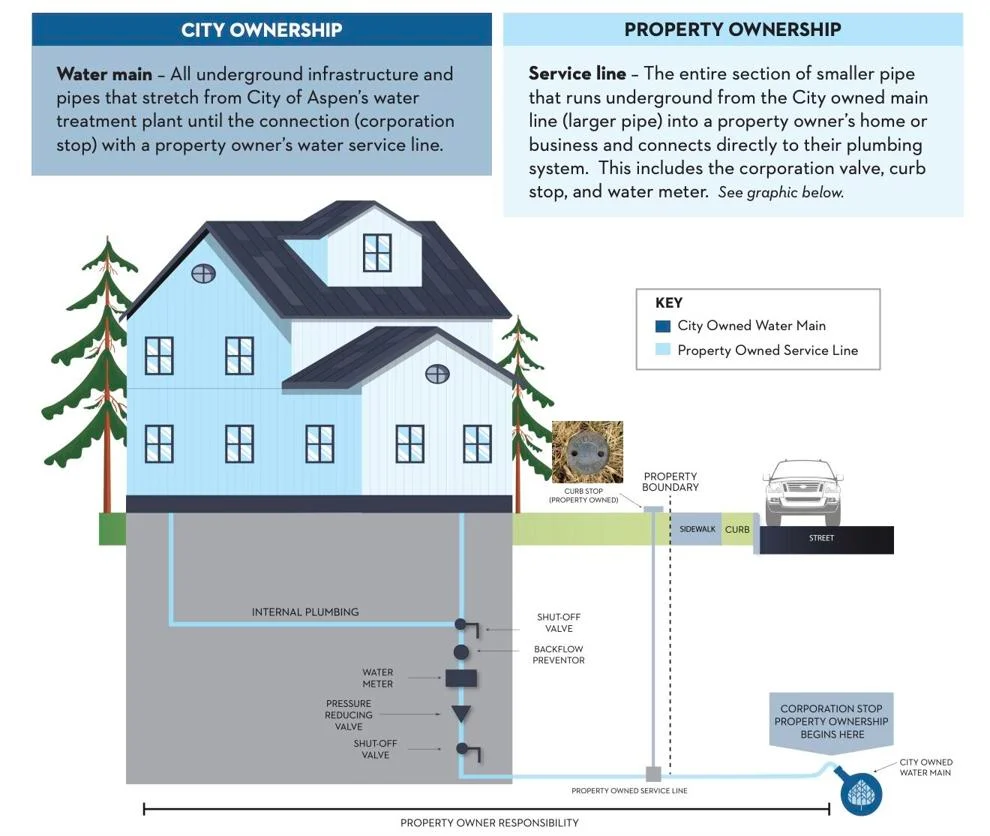

Following state and federal guidelines for safe drinking water, the city of Aspen is preparing to inspect the material used in some of the city’s water service lines.
The Environmental Protection Agency finalized its lead and copper rule revisions in December 2021 that established requirements for public water systems nationwide. To comply with the revisions, the city was required to submit a system-wide service line inventory and replacement plan by mid-October this year.
Aspen has monitored its lead and copper levels in the city’s water line system since 1992. Of the 4,121 water service accounts maintained in the city, none of them contain lead, according to the initial inventory of the service lines that was due to the state by Oct. 16. Four were identified as “galvanized requiring replacement,” and 76 were unknown and will require additional investigation. Lines considered galvanized and requiring replacement are service lines that did not have lead in the history of its service, but may have had the presence of lead “upstream of it in internal plumbing,” said Erin Loughlin Molliconi, utilities field operations manager for the city.
The city’s water service system is in a strong position compared to other public water systems of similar size and age, said Aspen Utilities Director Justin Forman during an Oct. 22 Aspen City Council meeting. Approximately 2% of the water service lines will need further investigation.
Property owners whose service lines are among the 76 with unknown materials will receive a letter from the city in mid-November detailing the process the city must take to examine their service lines and potential next steps.
Throughout the winter, the city will receive contractor bids to conduct potholing. It hopes to start investigating the service lines in the next right-of-way construction season, between April 1 and Oct. 31 of 2025, Loughlin Molliconi said. The extent of the potholing will depend on the location. It could either take place on the property near the property’s curb stop or on the corporation’s main service line stop.
“Depending on site constraints, we will work with each property owner to see what makes the most sense for ease of access,” she said. “So it may be that no private property coordination is required for some of these potholes if they’re done in the right of way near the water mains, but we haven’t dialed in the details of that just yet during the busy season.”
After potholing, the water department will communicate necessary steps to property owners whose water lines are considered galvanized requiring replacement.
If a service line needs to be replaced, the property owner will be required to replace the water line system to bring it up to current water distribution standards.
The water department does not have a fund dedicated for service line replacements, and there are no current state or federal funds available to private customers for the replacements. Loughlin Molliconi said it is possible there might be additional federal grant funding available after the EPA finalizes its lead and copper improvement guidelines, which were scheduled to be completed Oct. 30.
The city is collaborating with the Aspen-Pitkin County Housing Authority to determine if APCHA homeowners can apply for essential repairs pilot program grants to assist in service line repairs. All APCHA homeowners are eligible to apply for up to $10,000 in grant funds to go toward home repairs that are essential to the health, safety, and longevity of the household and the unit.
The city’s goal is to have all water lines that need replacement to be completed in two construction seasons, by the end of October 2026, Loughlin Molliconi said. But city staff will work with property owners on a case-by-case basis to determine timelines and payment options.
“Certainly, if the water department has capital projects planned for a mainline infrastructure replacement, if some of these addresses are on blocks that will have the main line replaced, there’s the opportunity for cost savings where the capital project might cover the replacement of some of that service,” she said. “So we’re certainly trying to get creative but also don’t want to necessarily set a precedent that is not necessarily fair to the other water customers.”
A water line replacement of this nature could cost from $10,000 to $20,000, she said. The water department also may work with homeowners collectively to determine cost-saving measures if several water lines on a certain block or in a certain neighborhood must all be replaced.
Public Works Director Tyler Christoff told the Aspen City Council during an Oct. 22 meeting that, in addition to complying with state and federal standards, it is in the customer’s best interest to replace aging water lines. Customers with galvanized service lines typically have lines that were installed in the mid 1980s, he said.
“I would add that folks with galvanized services are probably getting less than ideal water quality, probably from manganese or other elements like that,” Christoff said. “So we think it’s in their best interest to resolve that as well.”
The city council approved the first reading of an ordinance that will allow the water department to conduct field verification of the unknown water system lines and implement a replacement plan for services determined to require replacement. The ordinance also requires the water department to provide at least 72 hours notice to property owners and occupants before accessing property to perform potholing.